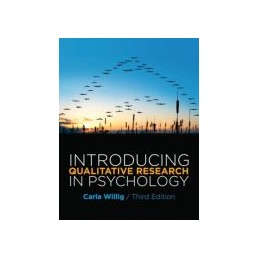- Reduced price

Order to parcel locker

easy pay


 Delivery policy
Delivery policy
Choose Paczkomat Inpost, Orlen Paczka, DHL, DPD or Poczta Polska. Click for more details
 Security policy
Security policy
Pay with a quick bank transfer, payment card or cash on delivery. Click for more details
 Return policy
Return policy
If you are a consumer, you can return the goods within 14 days. Click for more details
Throughout the new edition, material has been re-organized and updated to reflect developments in the field, while Carla Willigs style of writing, popular with students and lecturers alike, remains unchanged. Together with wider coverage of conceptual issues and epistemological & theoretical challenges in qualitative research, this third edition boasts three new methods chapters:: Thematic Analysis, Narrative Analysis and Visual Methodologies. Three additional chapters on Qualitative Research Design & Data Collection, The Role of Interpretation and Putting Together A Research Proposal will be invaluable to students and researchers during conceptual preparation.
This edition contains more interactive exercises and discussion points in order to help students understand what they are learning, as well as three qualitative research reports written by students.
The third edition is supported by a new Online Learning Centre www.openup.co.uk/willig with resources for lecturers and students.
With contributions from Sarah Jane Dryden, Caroline Silcock and Joanna Silver.
All students of qualitative research in psychology will find a wealth of information in Carla Willigs book. With its expanded sections and detailed consideration of concepts, techniques and applications of qualitative research, the interactive approach taken in this book is ably supported by extensive research examples. As usual with Carla Willigs clear and detailed writing style, this book will give both new and existing researchers the opportunity to think clearly about their use of qualitative research and its methods.
Dr Nollaig Frost, Senior Lecturer, Psychology, Middlesex University, UK
A tour de force from an expert guide which grounds students in the lexicon of qualitative psychology, before explicating a range of major methodologies. Students will appreciate many worked examples, and will be stimulated by the coverage of contemporary innovations, issues and debates - an invaluable textbook.
Professor Brendan Gough, Institute of Health and Wellbeing, Leeds Metropolitan University, UK
In just over a decade, Carla Willigs book has become one of the key introductory texts in the field. Many of my students and supervisees have enjoyed reading it - finding complex issues and debates have been explained in an accessible manner. This latest edition includes helpful advice on writing a research proposal, some newer research methods and discussion about the future of qualitative research. In addition, there are new chapters on epistemology and interpretation which I think my students will find particularly valuable as these are often the most challenging topics when one is new to qualitative research.
Dr David Harper, Reader in Clinical Psychology, University of East London, UK
Once again, Carla Willig has produced a wonderfully clear account of how and why qualitative methods ought be used to answer psychological questions. Not only does Willig examine key theories, ethics and debates surrounding the use and interpretation of qualitative data, she shows us how to do it - step by step, with a tremendous sense of balance and integrity. This new edition covers some of the more recent debates in qualitative research, contains new examples of how to design, carry out and approach analysis in qualitative methods and lots of useful questions that researchers ask themselves along the way. My students have used Willigs writings on qualitative methods for many years as they can understand and engage with it. There is simply no other equivalent text in psychology to rival Willigs - her clarity, conviction and sheer brilliance in putting difficult ideas on methods into plain language is something students in psychology will relish for a very long time to come.
Paula Reavey, Professor of Psychology, London South Bank University, UK
In writing this text originally, Carla Willig argued that, unlike quantitative research (where the aim is to follow a set of rules and get them right), qualitative research is more about having adventures. From the start it sounds a lot more fun, and certainly a lot more interesting! And it was. Students and lecturers alike appreciate its lively, practical approach, its very clear and elegant writing, its use of clever examples of students own work and its lucid explanations of the theory underpinning methods and methodologies. This new, third edition is a real triumph. Its more comprehensive and its bang up to date, with three additional new chapters, more examples of student projects, and overall an even more systematic approach. It is, in my view, the most approachable and person-friendly text around introducing qualitative research in psychology, and a great opportunity to boldly go, have adventures, and really get to grips with doing qualitative research.
Wendy Stainton Rogers, Professor Emerita, Faculty of Health and Social Care, The Open University, UK
Data sheet
Part 1: Conceptual Preparation
From recipes to adventures
Epistemological bases for qualitative research
Qualitative research design and data collection
The role of interpretation
Putting together a research proposal
Part 2: Doing Research
Thematic analysis
Grounded theory methodology
Phenomenological methods
Case studies
Discursive psychology
Foucauldian discourse analysis
Narrative psychology
Visual methods
Part 3: Reflections and Conclusions
Quality in qualitative research
Review and conclusion: Where next for qualitative psychology?
Appendix 1: What influences a persons decision to want to stop using drugs? A grounded theory study exploring the experiences of heroin users
Appendix 2: The experience of body dysmorphic disorder: An interpretative phenomenological analysis and photo elicitation study
Appendix 3: Constructing self-harm at the turn of the 21st century: A Foucauldian discourse analysis
References
